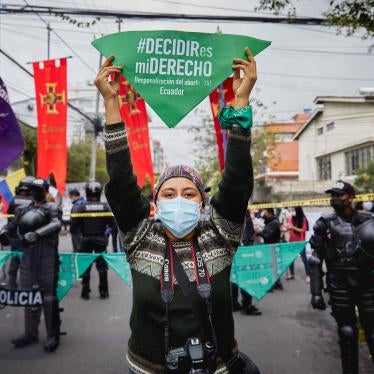(New York) - Women in Tierra del Fuego now have fewer options to prevent pregnancy and risk giving birth to unwanted children than they did a month ago. Thanks to a judge in Ushuaia, poor women and adolescents in this province no longer have access to emergency contraceptive pills. But the ruling, to suspend free distribution of these pills via the public health sector, is based on scientific ignorance and will have dire consequences for the health and well-being of poor Argentinian women.
Opponents of emergency contraceptive pills argue that the main component - the hormone levonorgestrel - induces abortion, and therefore violates the constitution's protection of life from conception. But that characterization is simply wrong: these methods work not by terminating pregnancies but by preventing them. The most recent scientific studies demonstrate that levonorgestrel, when administered as an emergency contraceptive, works by delaying or inhibiting ovulation and thus is not abortifacient. The World Health Organization, the International Federation of Obstetrics and Gynecology, and the broader scientific community all agree on this point - which is why other countries with restrictive abortion laws, like Brazil, Colombia, Nicaragua, Kenya and Thailand, and even other provinces in Argentina - allow public distribution of this emergency contraception.
Furthermore, prohibiting free distribution in public health facilities while pharmacies continue to sell the products discriminates against women with less money, especially adolescents, and discourages them from seeking medical care. The sooner treatment with emergency contraceptive pills is initiated, the more effective the results are. Any delay increases the risk of pregnancy.
In its 2005 report on reproductive rights in Argentina, "Decisions Denied: Women's Access to Contraceptives and Abortion in Argentina," Human Rights Watch identified three principal barriers to contraceptive access for women: domestic and sexual violence, provision of inaccurate and inadequate information, and economic constraints. The current judicial decision reinforces those barriers and constrains a woman's choices against her best health interests.
Widespread access to routine and emergency contraceptive methods in the public health care sector is especially crucial for poor and vulnerable sectors of the population, including rape survivors, indigent women and adolescent girls. Providing services in an environment that respects women's and adolescents' rights to full information, reproductive autonomy, privacy and confidentiality also affects their willingness to seek care. Moreover, providing emergency contraceptive pills can serve as a bridge to the prescription of a longer term, routine contraceptive methods.
Argentina's new National Program on Sexual Health and Responsible Procreation recognizes the need for timely, affordable and equal access to this and other contraceptive methods, and clearly stipulates widespread access to emergency contraceptive pills in its medical guidelines. But conservative forces in the Southern tip of the country are waging a "new crusade" against scientific judgment and official health policies, aggressively violating women's rights instead of protecting them.
The Tierra del Fuego courts should respect the Ministry of Health's program and the local authorities' implementation of the sexual and reproductive health guidelines - researched and reviewed exhaustively by top medical experts - that reflect Argentina's advance towards providing the best possible health care to its all of its citizens. Argentine women demand and deserve no less than what modern medicine can provide.
Angela Heimburger is the Americas researcher in the Women's Rights division at Human Rights Watch. Wayne Shields is President and CEO and Beth Jordan, M.D., is Medical Director of the Association of Reproductive Health Professionals in the United States.






